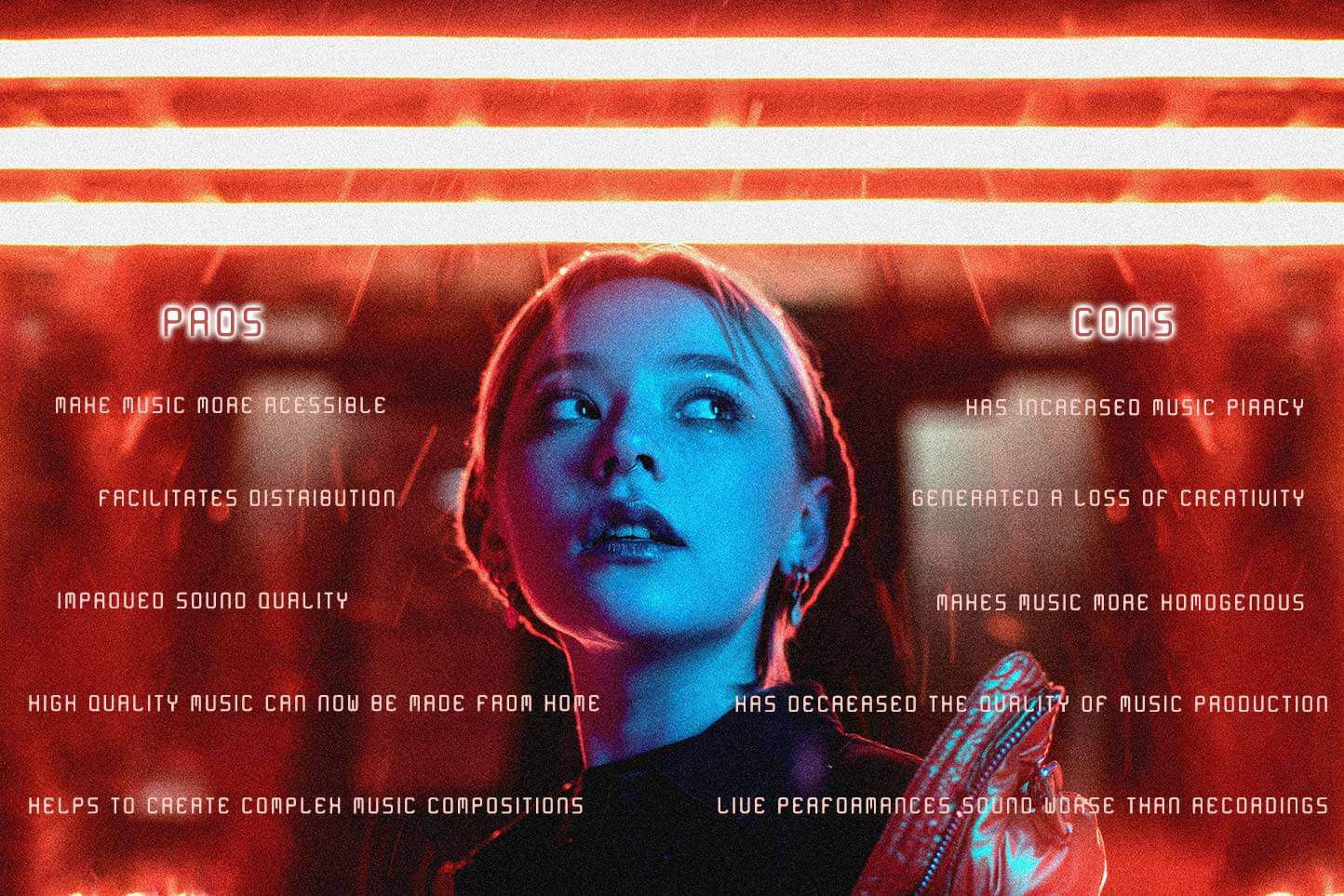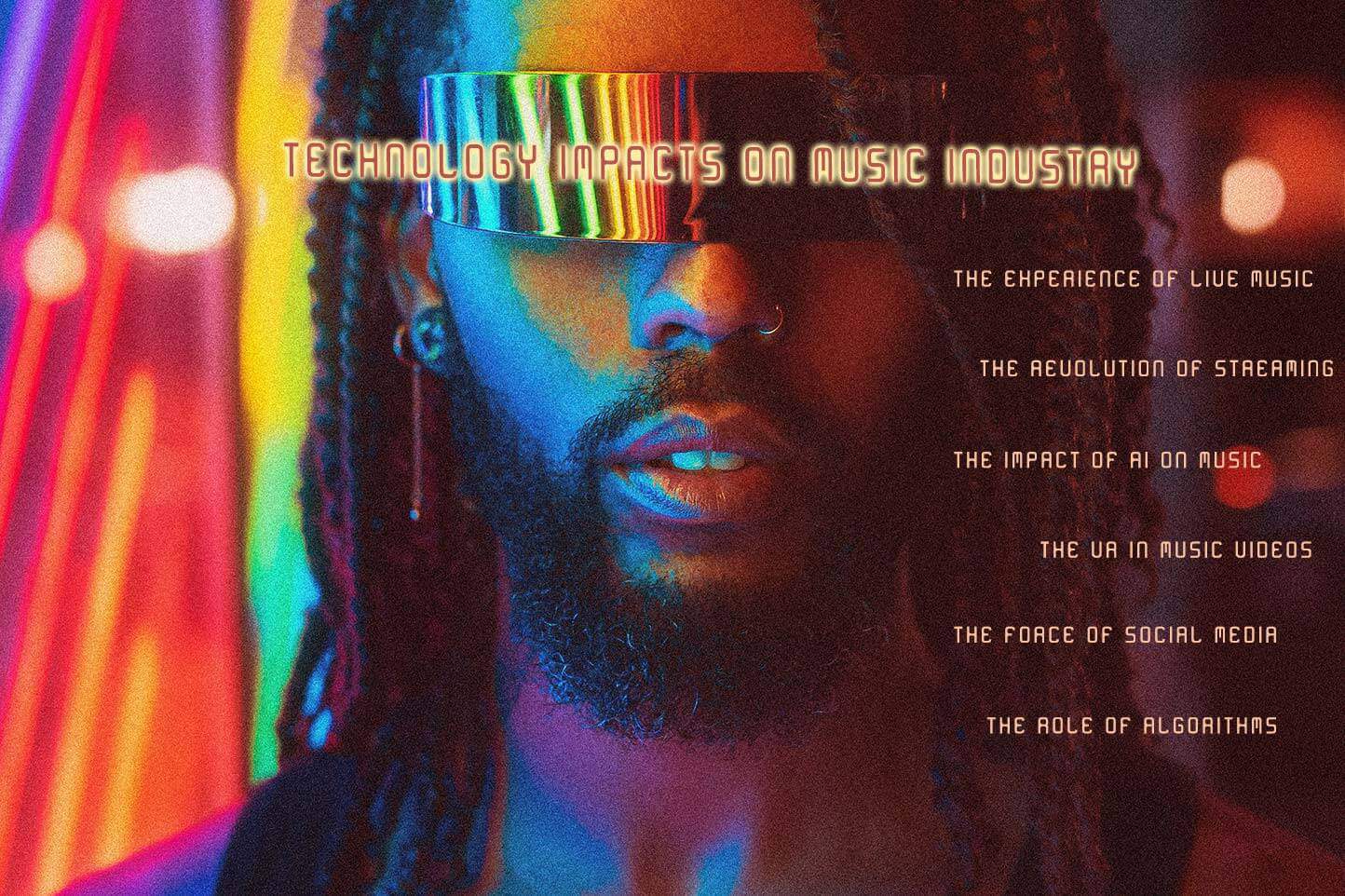

Knowledge of the latest developments in technology is vital for any music professional. If you have a firm grip over the new technology in music industry these days, you’ll be able to ace your work.
The music industry has been shaped by technology over the years. Streaming services and digital recording software have evolved from phonographs and tape machines. Digital technology has revolutionized every aspect of the music industry.
Composers can now create film scores from their homes. Through live-streamed performances, musicians can perform for fans around the world. Digital distribution allows songwriters to record and release albums without signing a deal.

Digital technology has revolutionized almost every aspect of the music industry. Some digital recording software and hardware made the recording process straightforward and cheaper. Compact discs reduced manufacturing and distribution costs and increased audio quality for consumers.
The music industry grew at first as a result of digital technologies. Napster followed. With the development of the internet, users could share and download music online. Dubbing tapes and burning CDs are no longer required for pirating music. Anyone could download virtually any song they wanted for free using file-sharing platforms.
If we classify the pros and cons of the new technology in music industry, we can have the following argument.
The studio version and live version of a song have always been different.
In the live version, many instrumental parts and vocal pieces are missing. Music performance has improved through digital audio workstations, synthesizers, and high-definition audio speakers.
It is easier to have a performance that sounds better than a record since all are played back as stems or loops.
Here are some of the pros of the new technology in music industry.
There are some disadvantages of having new technology in music industry. Though, they might be less than the benefits of advancements in music technology. But, we ought to mention them here.

Social media, Streaming, Augmented Reality, Virtual Reality (VR), and Artificial Intelligence (AI)These technologies have transformed the way artists share their work and interact with their fans. Artists can get real-time feedback about their marketing strategies from their fans. Using social media platforms provides a genuine brand connection.
With the advent of new technology in music industry, it can say that the music industry will never be the same again. Technological advancements had a significant impact on certain aspects of the music industry.
Live music hasn’t been stopped by technology, ironically. There have been tens of billions of dollars in earnings in the U.S. alone from the live music industry over the last ten years. In part, this can also be attributed to social media. Concerts are appealing because of the opportunity to post exciting pictures online.
The experience of listening to live music has changed dramatically due to technological advancements in the music industry. Since music is more commonly available over the internet, people hardly attend live concerts. However, it cannot be accurate to say that live music concerts have become extinct. Still, the excitement of people heading over to attend a live music concert has significantly dropped.
In the decade following the launch of the iPod, streaming revolutionized the music industry. From 2015 to 2021, Spotify, which leads the industry in music streaming, has reached 165 million Premium subscribers, up from 18 million in 2015. The streaming revolution changed how music is owned, which led to a change in money-making methods. Getting streams on platforms like Spotify or YouTube has become essential in the promotion strategy for musicians.
Music streaming platforms are benefiting from artificial intelligence and machine learning. Streamlining services use AI to increase storage, improve search engines, and make user-friendly platforms. Early streaming platforms rose due to the adoption of smartphones over a decade ago. Streaming will take on a whole new trajectory with the current AI and machine learning implementation.
Personalized experiences are already available today, and they can already customize. Users used to shop for vinyl records and cassettes back in the day. Digital music made it possible for users to search for songs online. We no longer have to search for new songs because AI changes our listening to music. Thanks to algorithms and AI technologies, the internet brings us new songs, albums, and performers.
More and more immersive videos have been uploaded to YouTube and Facebook since 2015 when the platform made 360-degree videos possible.
Virtual Reality, abbreviated as VR, has changed the way people listen and watch music. The graphics seen in the latest music videos, consisting of Virtual reality technology, are spectacular and loved.
In their combination, the songs and the imagery create a dreamy landscape. Fans also can connect with the artist on a deeper level.
As well as streaming, social media has the potential to be a powerful force in the music industry. One of the most influential platforms is TikTok. A TikTok trend can “blow up” a song or artist overnight if it features their music. Including random tunes from children’s cartoons, even the most obscure songs have been used as part of this process.
In the music industry, algorithms are the unseen powerhouse. By controlling streaming and social media platforms, we determine what viewers and listeners see and hear and what they don’t. There is no doubt that algorithms have had the most significant impact on music in the past decade.
New technology in music industry has completely changed how music lives in human life. Technology will revolutionize the balance between musicians and influential labels. This pushes experimental and niche music further into the mainstream. Thanks to computers, social media, and even artificial intelligence (AI), anything is possible in the music scene.
At SongLifty, we understand the relevance of new technology in the promotion process for musicians. Checking the rest of our blog will help you know how to promote your music on Spotify, YouTube, and more! It is also a good idea to use the SongLifty promotion package for Spotify, YouTube, SoundCloud, and other social media. We provide a good value for your money and help you grow your organic audience quickly.





We know how music marketing is challenging. Use our music promotion services to build and grow your audience today!
Artists from all around the world use our Spotify promotion services. With one of the best and safest promotion companies in the industry, you can purchase Spotify plays and raise your social media accounts.
Want your videos to get the attention they deserve? Stand out from the crowd with our YouTube promotion packages. Increase the number of people who watch your videos, and grow followers on your YouTube channel.
With a tailored strategy to increase your audience, we help you form a vivid presence on SoundCloud. We do that, by promoting your content, boosting your socials, and keeping in check your SoundCloud insights.
TikTok is a merry mix of people from all over the world and a home to many musicians for interacting with their fans, making it a great place to share and promote new music. Sign up with us and let us help you promote music on TikTok.
We understand how artists feel after launching an Instagram account: getting new followers can be really challenging. With our social promotion for Instagram, we help you grow your followers and increase engagement on your posts.
When it comes to music promotion, Facebook can prove to be a very powerful tool! With billions of users worldwide, it’s a great way to spread the word on new content and promote yourself in multiple communities at once!

We are an European company specialized in music production & promotion. Made with ♥ by a bunch of wonderful people from Switzerland, Netherlands, and Spain.
Songlifty, make your music stand out
© 2025 SongLifty, powered by SongLifty. All Rights Reserved.
[email protected] | +372 618 8225 | Terms & Conditions | Privacy Policy
We are in no way affiliated with, endorsed by, or connected to Spotify or any other social network.